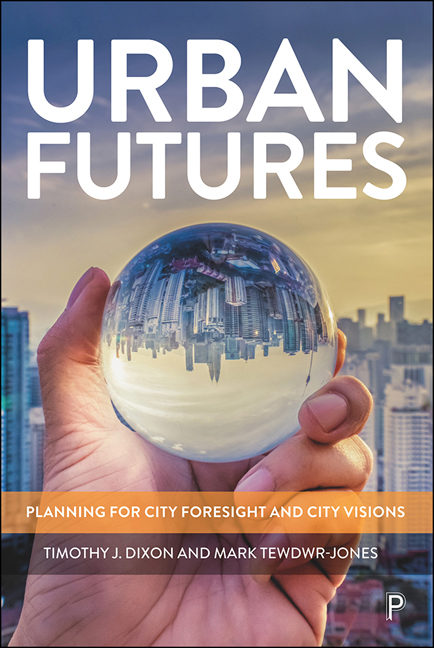Book contents
- Frontmatter
- Contents
- List of figures, tables and boxes
- Acknowledgements
- Foreword
- Preface
- 1 Urban futures: planning for city foresight and city visions
- 2 Cities and integrated urban challenges
- 3 Reimagining the city: views of the future from the past and present
- 4 Planning and governing the future city
- 5 Future narratives for the city: smart and sustainable?
- 6 Theoretical approaches to urban futures
- 7 Using city foresight methods to develop city visions
- 8 Shaping the future: city vision case studies
- 9 The innovative and experimental city
- 10 Visioning and planning the city in an urban age: a reality check
- 11 Conclusions: facing the urban future to 2050 and beyond
- Appendix: selected examples of city visions
- Notes
- References
- Index
4 - Planning and governing the future city
Published online by Cambridge University Press: 21 December 2021
- Frontmatter
- Contents
- List of figures, tables and boxes
- Acknowledgements
- Foreword
- Preface
- 1 Urban futures: planning for city foresight and city visions
- 2 Cities and integrated urban challenges
- 3 Reimagining the city: views of the future from the past and present
- 4 Planning and governing the future city
- 5 Future narratives for the city: smart and sustainable?
- 6 Theoretical approaches to urban futures
- 7 Using city foresight methods to develop city visions
- 8 Shaping the future: city vision case studies
- 9 The innovative and experimental city
- 10 Visioning and planning the city in an urban age: a reality check
- 11 Conclusions: facing the urban future to 2050 and beyond
- Appendix: selected examples of city visions
- Notes
- References
- Index
Summary
Introduction
We have seen through the course of the previous chapters of this book that the story of creating urban futures, from the development of visions to the employment of urban and regional planning as governmental intent and action, has been one of ebbs and flows. The case for initiating any long-term urban vision for a city, whatever its size and form, and at whatever moment in history it happens to be situated, has necessitated a political programme to deal with major complexities and externalities associated with the growth or decline of places – whether this has involved, for example, attempting to stymie rapid uncontrollable urbanisation, rolling out better and decent housing for those in need of shelter, providing adequate infrastructure to meet people's mobility needs and energy consumption, committing a city to green growth and sustainable practices, or ensuring good standards of health provision to address an urban society's basic human needs and survival. These issues, common as they are across time and space as a hallmark of urban living and urban trends, manifest themselves in different ways in different places. But the ways in which these issues are recognised, analysed and addressed within cities and nations have been the identifiable features of urban planning movements, enacted as functions of city governments.
The task of utilising urban and regional planning to examine all the changing aspects of urban life, by analysing problematic trends and trajectories and then ensuring a political and resourced programme of action to remedy them, is never a straightforward or easy process. Discussion of, and commitment to, an appropriate way forward for a city and region are heavily dependent on agreement on the validity of the intelligence and evidence base, on the various options available to think about the future, and on the political, economic, regulatory, social and environmental contexts for decision-making. As the task of planning proceeds even within a single nation, the world is forever changing, thus rendering agreed action plans potentially outdated by the time they are implemented. Ensuring that a city's political commitments are ‘future-proof ‘ is just one of the many requirements of shaping urban futures.
- Type
- Chapter
- Information
- Urban FuturesPlanning for City Foresight and City Visions, pp. 65 - 78Publisher: Bristol University PressPrint publication year: 2021



